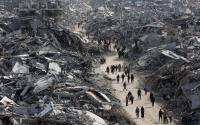27 April 2005 The Independent
Worldwide production of essential crops such as wheat, rice, maize and soya beans is likely to be hit much harder by global warming than previously predicted, an international conference in London has heard.
The benefits of higher levels of the main greenhouse gas, carbon dioxide, will in fact be outweighed by the downsides of climate change, a Royal Society discussion meeting was told yesterday. It had been thought that the gas might act as a fertiliser to increase plant growth. Rising atmospheric temperatures, longer droughts and side-effects of both, such as higher levels of ground-level ozone gas, are likely to bring about a substantial reduction in crop yields in the coming decades, large-scale experiments have shown.
The two-day meeting, entitled Food Crops in a Changing Climate, is focusing largely on tropical countries where most of the world's food is grown, and where people are most vulnerable to climate change.
It is bringing together leading scientists in the fields of meteorology, climate science and agriculture to report on the latest research, including growing crops in experimental conditions in the open air that simulate advanced global warming. Previously, such experiments had taken place in closed chambers, and these had suggested that the "fertilisation" effect of rising CO2 would offset the detrimental effects of rising temperatures and drought incidence on crop production.
But, a new technology known as Face (Free-Air Concentration Enrichment) is allowing treatment of large areas of crop with elevated levels of CO2 and ozone, and these experiments have painted a very different picture.
"Growing crops much closer to real conditions has shown that increased levels of carbon dioxide in the atmosphere will have roughly half the beneficial effects previously hoped for in the event of climate change," said Steve Long, from Illinois University.
"In addition, ground-level ozone, which is also predicted to rise but has not been extensively studied before, has been shown to result in a loss of photosynthesis and 20 per cent yield loss. Both these results show that we need to seriously re-examine our predictions for future global food production, as they are likely to be far lower than previously estimated," Professor Long said.
Additionally, studies in the UK and Denmark show that just a few days of hot temperatures can severely reduce the yield of major food crops such as wheat, soya beans, rice and groundnuts, if they coincide with the flowering of these crops.
These results suggest that there are particular thresholds above which crops become very vulnerable to climate change.
On a more positive note, the meeting also highlighted new developments in forecasting techniques, the basis of which can act as early warning systems of famine.
The techniques incorporate a climate prediction model with a model that simulates crop growth under varying environmental conditions.






